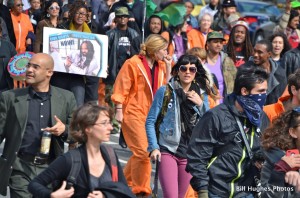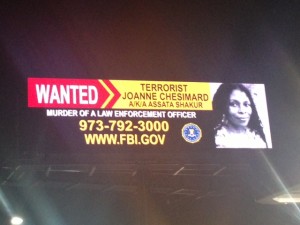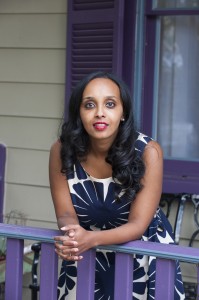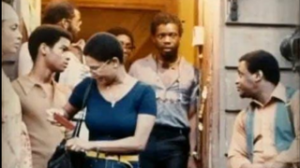Assata Shakur is Welcome Here: Bringing Political Prisoners Back Into the Fold
By Meron Wondwosen
Every generation honors its live conformists and its dead trouble makers—Mignon McLaughlin
It was November 5th 2005 and my first cousin was charged with treason by the Ethiopian government—a crime punishable by death or life imprisonment.
 Daniel and I share the same family features—same forehead. We have the same large eyes. We are in the same profession—the law. And much to our chagrin, because it’s painful sometimes, we were also born ready to fight for justice. And while three months earlier, in August of 2005, I was organizing a fundraiser for US political prisoners, he became an Ethiopian political prisoner.
Daniel and I share the same family features—same forehead. We have the same large eyes. We are in the same profession—the law. And much to our chagrin, because it’s painful sometimes, we were also born ready to fight for justice. And while three months earlier, in August of 2005, I was organizing a fundraiser for US political prisoners, he became an Ethiopian political prisoner.
He was among an elite group of journalists, lawyers, professors, human rights defenders and political opposition members arrested by the Ethiopian government in the wake of the regime’s disastrous interference in the 2005 elections. Like the 100 or so political prisoners held in US prisons, in Ethiopia, Daniel was incarcerated for his political views and activities. The difference was, when the demand for Daniel’s release was made, international organizations heeded the call. There was worldwide condemnation of the arrests; he was labeled a prisoner of conscience and the mobilizations began from the Diaspora and various countries across the globe.
For those of us far removed from the brunt of the Ethiopian regime’s daily brutality, it seems much safer to call to task a rogue African regime than it is the government of the United States. Is anyone surprised that a regime, which runs down its citizens in broad daylight using US made Humvees, is incarcerating individuals for election protection work? This isn’t to diminish the importance of fighting against injustice regardless of where it is occurring or to undermine what we did for two and a half long years to ensure Daniel’s safety and his release—it is however highlighting the insurmountable odds some of us face when organizing on behalf of political prisoners in the United States.
Discussing Daniel’s case—because it implicated a regime known to be corrupt and brutal—made it easier for individuals to digest the injustice of his incarceration. Yet in the next breath, when I mentioned that even an hour or two away from New York City, we are holding our own citizens as political prisoners, the mood shifts. Asking these same individuals to acknowledge that there are persons incarcerated for their political views in the United States is another matter.
 It is no surprise then that there are rarely international calls for the release of many US political prisoners. And if there are, it is a nuanced, singled out scenario in which an individual is deemed a prisoner of conscience and who must be a paragon. It can never be Dr. Mutulu Shakur, an acupuncturist specializing in healing drug addiction, because he was accused of liberating Assata Shakur from prison. It can never be Herman Bell, who while incarcerated for 35 years helped to develop the concept for an organic farm in upstate Maine, because he is accused of involvement in the death of a police officer. It can never be Sekou Odinga, who has served over thirty years, because he was a member of the Black Panther Party.
It is no surprise then that there are rarely international calls for the release of many US political prisoners. And if there are, it is a nuanced, singled out scenario in which an individual is deemed a prisoner of conscience and who must be a paragon. It can never be Dr. Mutulu Shakur, an acupuncturist specializing in healing drug addiction, because he was accused of liberating Assata Shakur from prison. It can never be Herman Bell, who while incarcerated for 35 years helped to develop the concept for an organic farm in upstate Maine, because he is accused of involvement in the death of a police officer. It can never be Sekou Odinga, who has served over thirty years, because he was a member of the Black Panther Party.
Many would not call for the release of these political prisoners—never mind that their human rights work was and remains criminalized and as Africans, they are never allowed to defend themselves or their communities.
For the rest of us, these political prisoners will always be our exemplars because we understand that their stories have been twisted to erase their human rights work. Behind those prison walls, these elder social justice activists have languished for 30, 35, 40 years. When Daniel was arrested, what I knew about the political prisoners in the United States led me to one understanding: we needed to keep the world’s attention on his case. The situation in Ethiopia is harrowing—they will assassinate you in prison and label it an accident, a suicide.
***
Dhoruba Bin Wahad, a former political prisoner, while speaking at Columbia University a few years ago distinguished Black political prisoners in the United States from those in other countries. He noted for example that at the defeat of Apartheid, South African freedom fighters were released from prison. There was no such release for US political prisoners. His theory is that in South Africa, the freedom fighters won the struggle against Apartheid and their soldiers were released from prison.
One may argue that our political prisoners were not released because we didn’t defeat white supremacy—rather we masked it and made it more palatable with integration. What we got was assimilation into the fringes of a middle class existence which dared not mention political prisoners. When your ideology doesn’t win, your soldiers are not released from prison. Rather they continue to be imprisoned and are punished—most likely very harshly. No only did your views not prevail but these political prisoners are now used as examples by the “winners” to ensure that the next generation doesn’t produce any more human rights defenders.
This strategy has been operational for decades and it has been successful to a large degree. In fact, we have effectively allowed our political prisoners to be disassociated from the general work for liberation. If we are discussing the health of the Black community, we never mention political prisoners. If we are discussing education, we never discuss political prisoners. When we are fighting against police brutality, we never implicate political prisoners.
It is of course an ahistorical notion—that we can somehow discuss human rights and liberation and exclude political prisoners. These human rights can never be removed from the work of the community because they are of the community. They are the foot soldiers of the liberation movement. More critically, each of the areas in which we are working today, is most assuredly a human rights struggle that they have been waging since at least the 1960s or 1970s. It was these elder social justice activists who began health centers, including acupuncture clinics to cure drug addiction. It was these now incarcerated Panthers who not only educated the community but also established free breakfast programs for Black children and it is these political prisoners who monitored, documented and challenged police brutality against the community. And yet we proceed with our work on human rights today as though the most ardent supporters haven’t been languishing in prisons for decades.
Interestingly enough, this same strategy of disassociating political prisoners from the condition of the overall struggle for liberation was pushed by various factions in my cousin’s case. Tactically, some international organizations did not want to link Daniel’s plight with that of the greater struggle for human rights in Ethiopia. This latter strategy would have challenged them to grapple with what happens if Daniel isn’t released (do they broaden the struggle to all human rights violations committed by the regime?) and what if he is released (do they walk away, congratulating themselves on their victory—leaving 80 million other citizens to continue to suffer under the regime?)
To some of us the answer was clear—leading to awkward international calls with various “no” votes on translations of my statement that “a call for Daniel’s freedom should be a call for Ethiopia’s freedom.” Those voting “no” believed gaining Daniel’s release would be more difficult if we tied it to the larger cause of Ethiopia—it is regime change, they argued—it is human rights, we countered.
In the US, by isolating political prisoners from the larger Black community, the government has made it easier for us to forget about them. In dream hampton’s brilliant and necessary documentary, Black August: A Hip Hop Benefit Concert, Nehanda Abiodun, community organizer and human rights activist discussed the role of the Black community. She noted that the community protected her and provided her safe passage when she was targeted by the US government. Her crime was engaging in human rights work. She acknowledged that community members may not have agreed with her political line or ideology. However, they knew that she was working for the betterment of the Black community. When she needed to go underground, the community provided her safe haven, shuttled her from place to place, provided her cover and eventually, spirited her to freedom in Cuba.
The Black community, beleaguered as we may have been and, encouraged to turn our backs on our human rights defenders, protected Nehanda as well as Assata Shakur. Africans understood that these women were engaged in human rights work critical to the community. The lesson learned from Nehanda’s story is the importance of making the movement and the stories of these political prisoners accessible and relevant to our community. We have to shift the discussion away from the distortions of the government and continue to discuss their service to the community. Imagine what improvement might have been made in healing drug addiction if Dr. Mutulu Shakur continued his innovative acupuncture work. The Panthers developed a free breakfast program for school children, which was appropriated (without credit!) by the United States government and included in all schools—imagine what else the Panthers could have developed! More than four decades after these human rights defenders conducted cop watch programs, state-sponsored violence—especially in the form of police brutality—continues to terrorize the Black community. Imagine what other groundbreaking ideas they may have implemented.
We have to convey the stories of these elder social justice organizers and their work within the context of what our communities need today—because it is from the larger Black community that we need buy-in to bring these human rights defenders home.
The community’s support for political prisoners is critical in Ethiopia as it is in the United States. For the first several months after the arrest of Daniel and his co-defendants, the line of visitors stretched for miles and was visible from the main road leading up to the prison. By the time I arrived to visit him a year later, the line of visitors had been moved to the back road by the Ethiopian government. Such obvious and visible support for the political prisoners from the citizenry was unacceptable. It sent a strong message to the outside world that Ethiopians were watching and visiting and sustaining hope.
The road leading up to the infamous Kaliti prison where Daniel was incarcerated is lined with majestic eucalyptus trees swaying in the cerulean Addis skies. My visit took place before the government of Ethiopia began their torture regimen so Daniel looked relatively well for having been in prison for one year. “Selam new?” he asked. Is it peace? I always marvel at Ethiopian greetings because when I translate them literally, they seem to hit me in the gut. Of course I wanted to answer no, it isn’t peace. It’s war. Although I nodded, he repeated “Selam nesh?” Are you peace, are you well? No, I was a riotous mess.
Daniel started speaking about the eucalyptus trees since it seemed like the only safe subject in front of the eavesdropping guards who crowded around us. “Did you know that King Menelik brought those to Ethiopia after one of his trips abroad?” Once the guards moved on, bored by our topics, Daniel asked me whether I was shocked by the sight of the prison. I mumbled that a prison is a prison and is the same everywhere. He frowned and said he doubts that the conditions of prisons and the treatment of prisoners in the U.S. are comparable. I wondered if he knows of the horrendous conditions in which political prisoners in the U.S. are held. Solitary confinement. Torture. We will discuss that when you are out, I advised him.
He, unlike many other prisoners whose incarceration is not political, is not allowed to teach, participate in any of the various activities offered in the prison or even continue his education—he was in the midst of earning a PhD from Oxford University when he was arrested.
We have been moved seven or eight times already. You get used to a cell. Set it up as you like it and then out of nowhere you are told that you will be moving. So you scurry about, hurrying to find all your belongings and set up shop in a new cell.” Then he paused and had a sad smile. “But what can you say. Don’t worry.” He winked at me. “This too shall pass. We will survive even this.
As I walked back to the car, I wondered if the guards knew whom they have imprisoned. Do you have idea who you have locked up? I couldn’t resist asking one of the guards, in my terribly accented Amarinya. The prince of Ethiopia, he mocked me. No, I shook my head, even more important, the future of Ethiopia.
Daniel was released in May of 2008 , two and a half years after that fateful November day. It was because of the Ethiopian community’s support—the Diaspora as well as the ones at home. It was because we internationalized his case. It was because we kept the world’s attention on him for two and a half years by constantly writing letters, articles and lobbying for his release.
While Daniel is free today, eighty million other Ethiopians remain under the clutches of a regime continuously violating their fundamental human rights.
It would serve us well to remind that regime that we are still watching.
***
The government of these United States needs reminding too—although they are very clear who they have locked up. Hence, the recent addition of Assata Shakur to the FBI list of terrorists; the refusal to consider parole for political prisoners even after 40 years of incarceration; the reluctance to release political prisoners who are on their death beds and then begrudgingly releasing them on the eve of their passing.
More importantly, it’s now time to ask ourselves that same question: do WE have any idea who we have allowed to remain locked up?
Read about them. Write them letters. Join their parole campaign. Herman Bell has a hearing in 2014. Do a teach-in. Host a fundraiser. Talk to others about them. Infuse their work, their names and their courage into your community work.
It’s time to bring them back into the fold; It’s time to bring them home.
****
Get involved with the Free Mumia Movement
Visit the Bring Mumia Home website
Connect with the Bring Mumia Home campaign on twitter
Contribute to the “60 for Mumia’s 60th Birthday” Indiegogo campaign
Sign the petition to Free Mumia on change.org
_________________________________________________________
 Born in Ethiopia, Meron Wondwosen was raised in Africa and Europe, prior to immigrating to the United States at the age of 13. She has practiced law in a range of areas including corporate finance and securities, banking, voting, and international human rights. Meron was also a co-coordinator of the Black August Hip-Hop Project, an international artist and activist collaborative that focuses on the link between human rights and hip-hop. Meron has authored and co-authored several reports submitted to the United Nations on the state of human rights in the United States and Ethiopia. She is also the author of an unpublished manuscript on her adventures as a Black lawyer girl on Wall Street. Meron is a mother, wife, feminist, and a fourth generationtej brewer.
Born in Ethiopia, Meron Wondwosen was raised in Africa and Europe, prior to immigrating to the United States at the age of 13. She has practiced law in a range of areas including corporate finance and securities, banking, voting, and international human rights. Meron was also a co-coordinator of the Black August Hip-Hop Project, an international artist and activist collaborative that focuses on the link between human rights and hip-hop. Meron has authored and co-authored several reports submitted to the United Nations on the state of human rights in the United States and Ethiopia. She is also the author of an unpublished manuscript on her adventures as a Black lawyer girl on Wall Street. Meron is a mother, wife, feminist, and a fourth generationtej brewer.





Pingback: Assata Shakur iz Welcome Here: Bringing Political Prisonerz Back Into the Fold | Moorbey'z Blog